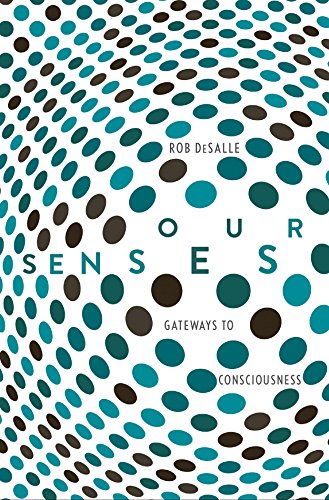![]() Our Senses: An Immersive Experience by Rob DeSalle
Our Senses: An Immersive Experience by Rob DeSalle
 Our Senses: An Immersive Experience (2018) is, perhaps appropriately given its topic, a dense and at times perhaps overwhelming exploration of how our minds take in information and make sense of it. While I found much of it utterly fascinating, and would recommend it, I have to confess there were times I was tempted to skim and felt the book became either a bit unfocused or, on the flip side, hyperfocused. It didn’t help — and this is clearly no fault of author Rob DeSalle — that the formatting on the Kindle got confused by insets, so that it took a moment to track just where a sentence was going. Here’s hoping that gets fixed soon.
Our Senses: An Immersive Experience (2018) is, perhaps appropriately given its topic, a dense and at times perhaps overwhelming exploration of how our minds take in information and make sense of it. While I found much of it utterly fascinating, and would recommend it, I have to confess there were times I was tempted to skim and felt the book became either a bit unfocused or, on the flip side, hyperfocused. It didn’t help — and this is clearly no fault of author Rob DeSalle — that the formatting on the Kindle got confused by insets, so that it took a moment to track just where a sentence was going. Here’s hoping that gets fixed soon.
You might have expected DeSalle to have organized the book by the six basic senses: taste, touch, smell, sight, sound, and balance (this last one was new to me as a “basic” sense), but you’d be wrong. First, he notes there are a lot more than those six; numbers vary depending on who you ask, but some, he notes, argue for as many as thirty-three, though he admits that’s too unwieldy a number for his purposes. As far as organization, he eschews separate chapters for each sense (the usual route) and instead moves amongst them as he explores “six important phenomena researchers have recognized in explaining the senses”:
- How our neural systems evolved from the earlier microorganisms
- The “super senses” of other organisms that can help shed light on our own
- Human variability: those with superior and diminished sensing capabilities
- The effect of trauma on specific senses
- The interaction of our senses with one another (synesthesia being the extreme example)
- “Crossmodality”: how our senses communicate with each other ― particularly in higher-order perception of external stimuli like art, music, literature, and drugs ― and how cross-modality creates a total consciousness
DeSalle is writing for the layperson here, but some scientific literacy and a sense of basic anatomy will come in handy as he tosses around terms like photons, molecules, lock-and key proteins, etc. Most times he’ll offer up a brief definition or explanation, but having a firm grasp of basic scientific terminology will go a long way toward making Our Senses flow more smoothly. Mostly it goes down easily with just a modicum of attention, but some sections get quite dense and, I’d guess, will require rereading for most of his audience. And every now and then, I’d say his asides or metaphors can be more distracting than enlightening, though those cases are rare.
Along with the scientific detail, DeSalle offers up a wide variety of fascinating facts, experiments, and comparisons with other species. The evolutionary aspects are thorough and detailed, the cross-modality section even more so, and therefore that segment is perhaps the most dense and difficult to get through. As noted, sometimes I could have used a bit less detail or maybe some better spacing between heavy detail and the occasional pop references (Spinal Tap makes an appearance, for instance) or more basic explanations. And personally I would have liked to have heard more toward the end about hallucinations (what is here is fascinating), the effects of arts and music, and how our senses will be continue to be augmented by technology (something he does touch upon, but only slightly, though in fairness that could probably have been its own book).
DeSalle’s writing is solid and informative, but I wouldn’t call it particularly engaging or compelling. This isn’t the Oliver Sacks’ (who also makes an appearance or two) style of personal engagement and I wouldn’t put it alongside recent non-fiction like The Radium Girls or Caesar’s Last Breath in terms of emotional impact or stylistic aplomb. But if it’s a bit dry, it does its job of informing and leaving the reader wanting to explore further. Recommended.



Do it! One of the best things I've read in recent years.
This reminds me. I want to read Addie LaRue.
We’re in total agreement David!
I felt just the same. The prose and character work was excellent. The larger story was unsatisfying, especially compared to…
Hmmm. I think I'll pass.